
THE VOICE OF INTERNATIONAL LITHUANIA
|
VilNews has its own Google archive! Type a word in the above search box to find any article.
You can also follow us on Facebook. We have two different pages. Click to open and join.
|
Archive for April, 2011
Lithuania’s impressive recovery continues
- Posted by - (0) Comment
![]()

By Violeta Klyviene - Danske Bank
Today Lithuanian Statistics published the flash estimate of GDP growth for Q1 11. GDP unexpectedly accelerated to 6.9% y/y, significantly up from 4.8% y/y in Q4 10, seasonally-adjusted GDP increased by 3.5% q/q. The outcome was significantly higher than our and consensus forecast (5.1% y/y).
Details
Lithuanian GDP increased by 6.9% y/y in Q1 11, significantly up from 4.8% y/y in Q4 10. We expect the Lithuanian economy to grow by 4% y/y in 2011, but there is a clear upside risk to our forecast.
Assessment and outlook
The Lithuanian GDP outcome in Q1 11 was significantly higher than our and consensus forecast (5.1% y/y). Although detailed statistics have not been published yet, it looks like the Lithuanian recovery has become more broad based and was derived not only by robust export performance, but also by notable growth in private consumption. However, the impressive recovery was partially determined by the low base effect.
Regarding this year’s development we emphasise that growth might exceed our expectation (4% on average). However, Lithuanian quarterly national accounts data are characterised by significant corrections, so we are not changing our forecasts for this year until the publication of the final data for Q1 11.
The biggest risk to the economic recovery is still associated with the accelerated inflation, which is mainly determined by external factors and as a consequence cannot be handled effectively. Eurozone debt crisis risk remains relevant as well. Under the unfavourable scenario, Lithuanian will be unable to escape the negative effects of a full-scale sovereign debt crisis, but the economy fundamentally looks much stronger than a few years ago.
Otherwise such risk confirms the need to pursue fiscal consolidation targets in the medium term.
- Bookmark :
- Digg
- del.icio.us
- Stumbleupon
- Redit it
My mother’s Napoleon
- Posted by - (1) Comment
 |
Napoleonas torte (Recipe translated by my mother Romute Petkaitis years ago) By Ellen Carmichael Illustration: Lithuanian Bakery, Nebraska, USA http://www.freshfromne.com/nebraska-food/lithuanian- bakery-napoleonas-torte-3-pounds The Lithuanian Bakery is an Omaha based producer of specialty breads and Lithuanian tortes. In over 40 years of operation the Lithuanian Bakery has successfully established itself in the specialty baked goods market. The specialty breads and tortes are produced daily by an experienced staff committed to high quality products and customer satisfaction. |
Waffle - 4 1/2 C. flour
little salt (they never measured)
Cut in 4 1/2 sticks unsalted butter. When butter is well cut with flour, in separate bowl mix:
3 eggs
4 1/2 Tbs water
then add to the flour mixture. Mix well. Put in refrigerator for 5-7 hours or overnight. Next day, divide dough into 8 to 10 pieces. Roll out each piece very thin to around 11 inches and bake in 375 to 400 degrees for 20 minutes on cookie sheet until light golden brown.
Cream - 3/4 C. flour
1/2 C. sugar
2 C. milk
Mix all together and cook on low-medium heat until it gets a little thick.
Mix........2 eggs and put in mixture of flour and milk. Mix well and set aside until well cooled.
Then whip..2 boxes sweet whipped butter
3/4 C. sugar
4 egg yolks
Once it is whipped together, put into the flour and milk mixture which should be almost room temperature. Mix well. Then add:
1 Tbs. brandy extract
1 Tbs. orange extract
1 Tbs. vanilla extract
1 Tbs. lemon extract
Rind from 1 lemon
lemon juice from 1 lemon
1-2 jiggers (1 1/2 oz each) of V.O. or any other good whiskey
Mix all ingredients together.
Spread thinly between layers leaving some for top and sides. With sharp knife, cut cake to shape it round, saving the crumbs. Spread remaining cream on the top and sides. Sprinkle the top with the saved crumbs. Decorate top with a few thin twisted orange slices.
Recipe can be increased to 1 and a half the ingredients to make a taller, more dramatic torte. Well worth the time and effort. Labai skanu!
- Bookmark :
- Digg
- del.icio.us
- Stumbleupon
- Redit it
Lithuania’s impressive recovery continues
- Posted by - (2) Comment
![]()

By Violeta Klyviene - Danske Bank
Today Lithuanian Statistics published the flash estimate of GDP growth for Q1 11. GDP unexpectedly accelerated to 6.9% y/y, significantly up from 4.8% y/y in Q4 10, seasonally-adjusted GDP increased by 3.5% q/q. The outcome was significantly higher than our and consensus forecast (5.1% y/y).
Details
Lithuanian GDP increased by 6.9% y/y in Q1 11, significantly up from 4.8% y/y in Q4 10. We expect the Lithuanian economy to grow by 4% y/y in 2011, but there is a clear upside risk to our forecast.
Assessment and outlook
The Lithuanian GDP outcome in Q1 11 was significantly higher than our and consensus forecast (5.1% y/y). Although detailed statistics have not been published yet, it looks like the Lithuanian recovery has become more broad based and was derived not only by robust export performance, but also by notable growth in private consumption. However, the impressive recovery was partially determined by the low base effect.
Regarding this year’s development we emphasise that growth might exceed our expectation (4% on average). However, Lithuanian quarterly national accounts data are characterised by significant corrections, so we are not changing our forecasts for this year until the publication of the final data for Q1 11.
The biggest risk to the economic recovery is still associated with the accelerated inflation, which is mainly determined by external factors and as a consequence cannot be handled effectively. Eurozone debt crisis risk remains relevant as well. Under the unfavourable scenario, Lithuanian will be unable to escape the negative effects of a full-scale sovereign debt crisis, but the economy fundamentally looks much stronger than a few years ago.
Otherwise such risk confirms the need to pursue fiscal consolidation targets in the medium term.
- Bookmark :
- Digg
- del.icio.us
- Stumbleupon
- Redit it
What does Lithuania need?
- Posted by - (0) Comment
![]()
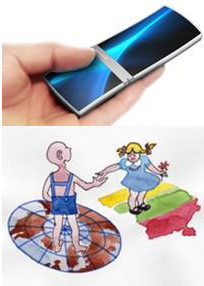
Two Words:
1) A NOKIA
2) EMIGRANT POPULATION
A brand name that unites Lithuania's creative, scientific, and business minds. NOKIA was born in a nation with a population of 5.4 million people. Lithuania's current population is a couple million short of that, but add to it its emigrant population and it is equal or even better. Look at what Harvard Business Review (December 2009) has to say about innovators:
"One of the most powerful experiments innovators can engage in is living and working overseas. Our research revealed that the more countries a person has lived in, the more likely he or she is to leverage that experience to deliver innovative products, processes, or businesses. In fact, if managers try out even one international assignment before becoming CEO, their companies deliver stronger financial results than companies run by CEOs without such experience - roughly 7% higher market performance on average."
Lithuania needs its emigrant population!
Best regards,
Jennifer Lambert,
Washington, USA
- Bookmark :
- Digg
- del.icio.us
- Stumbleupon
- Redit it
The Greeks won, the Lithuanians lost!
- Posted by - (2) Comment
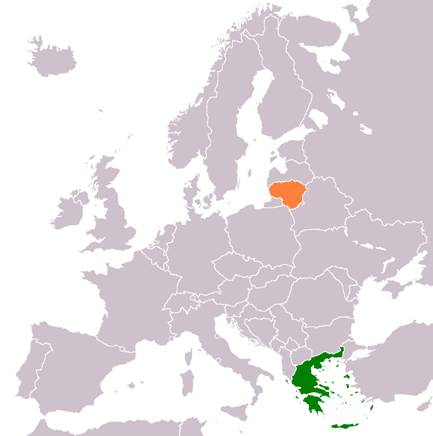
Before they realized what is going on and who was robbing them, the Lithuanian people got clubbered by PM Kubilius’ ambitious austerity policy and the younger ones started emigrating in catastrophic numbers, seeing no future in the country whose GDP was reduced (from a low post-Soviet level) by some 20% by the combination of the old nomenklatura rent-seeking policies and the global Great Recession. Lithuania is hollowing out, unfortunately.
Palemonas Legend: A Tale of Two EU Nations
Since the annus mirabilis 1989 the theory was that Central and Eastern Europe, CEE, would use its abundant and relatively educated labor force to grow faster and on a more sustainable and consumer-oriented (prosperity) basis due to shift to markets and euro-integration.
What got in the way is the theory of (rational?) expectations?
True, CEE did receive a sort of a very modest version of Marshall Plan from the EU. True to four EU freedoms, Western Europe is opening to labor movements (emigration) from CEE. So when new CEE policymakers were implementing liberal market reforms, they should have anticipated some outflows of labor force to higher bidders in Western Europe due to simple demonstration effect.
What got in the way is the law of unintended consequences in complex processes?
When the British opened their labor markets to the East, they anticipated some 10-12 thousand immigrants from Poland, for example, what they got is some one million and rising. Who knows what the figure will be when Germany opens this May?
The tale of two EU nations: What got in the way is the paradigm of hard-to-calculate policy externalities?
The current Kubilius Government of Lithuania adopted a very ambitious (no IMF help even sought!) and rather harsh austerity modeled on the reigning EU thinking in order to clean the Augean stable of Lithuania's finance wrecked fo by former Soviet nomenklatura hijacked governments that largely used EU money to place their cronies in plum jobs (to the exclusion of younger generation of course!), "prikhvatize" real estate and keep it from any taxation, etc. Consequently, Lithuania did not attract much Western direct investment so the productivity remained at low post-communist levels at the time when emerging Asia provides stiff global competition.
Before they realized what is going on and who was robbing them, the Lithuanian people got clubbered by this new ambitious austerity policy and the younger ones started emigrating in catastrophic numbers, seeing no future in the country whose GDP was reduced (from a low post-Soviet level) by some 20% by the combination of the old nomenklatura rent-seeking policies and the global Great Recession. Lithuania is hollowing out, unfortunately.
While the Lithuanians sobered rather in time, the Greeks have been continuing the party until the last bottle:)
Greeks won, Lithuanians lost! This is the tale of two integrating nations: they are even related since ancient times according to a Greek Palemonas legend.
Wishing you all the best, I remain
Yours Sincerely
Valdas Samonis, PhD, CPC
The Web Professor of Global Management(SM)
Institute for New Economic Thinking, New York City, USA
and Royal Roads University, Canada
Knowledge Management Editor, Transnational Corporations Review (TNCR)

Val Samonis, PhD, CPC, (val@samonis.com) has worked with top business, technology, and policy leaders in many countries, e.g. Nobel Laureates in Economics and Finance (Tobin, Arrow, Solow, Leontieff, Klein) as part of The Stanford Economic Transition Group; Polish Deputy Prime Minister L. Balcerowicz, Czech Deputy Prime Minister P. Mertlik; other top experts globally; lectured internationally on trade, investment, corporate governance/finance and enterprise restructuring, competitiveness, and ICT & knowledge management (KM) in the global economy; and has been extensively published.
He has been contributing research to The Joint (Business, Government, Academia) Committee on Corporate Governance (Canada); on FDI and knowledge economy clusters to Columbia University's VCC Center on Sustainable Investment; publishing at The Knowledge Board, the European Union's main KM think tank. Also, Val Samonis has been serving as a knowledge management expert in global business and advisor to a number of governments, international organizations, business, and academia on four continents; individually and via his virtual network organization SEMI Online (www.samonis.com) established since the mid-1980s.
Dr. Samonis managed and/or worked in international research and advisory ("blue ribbon") teams sponsored by The Business at the Bottom of the Pyramid Initiative (Cornell University and the University of Michigan); The African Capacity Building Foundation (G-7 countries and global institutions); The Virtual Consultation Forum for the First Inter-American Meeting of Ministers and High-Level Authorities on Sustainable Development; The Hudson Institute; World Bank; The OECD-World Bank Private Sector Advisory Group on Corporate Governance; USAID; CASE Warsaw; EU (ACE, TEMPUS); Soros Foundations; The Center for European Integration Studies (ZEI Bonn); ACCC/AUCC/CIDA (Canada); and a number of governments, e.g. in Baltic States, Poland, Canada. Dr. Samonis served as an advisor to the Czech Government, the Lithuanian Parliament, international organizations (e.g. UNCTAD, WTO, ITC), and multinational corporations (e.g. CARE, Medley Global Advisors, Andersen Consulting). Prof. Samonis has been teaching online, onsite, and his DualModeInstruction(SM) comprehensive and specialized courses, modules, seminars, training sessions, briefing sessions, occasional lectures, as well as doing research and supervising graduate (EMBA, MBA, MA, PhD, DBA) students at the University of Toronto (Canada), Royal Roads University (Canada), Lansbridge University (Canada, Asia), University of Maryland UC (USA), Center for University Studies (USA & Mexico), National American University, (USA and globally), Touro University International (USA and globally), Warsaw School of Economics (Poland), The International Trade Research Institute (Poland), University of Tasmania (Australia), The Center for European Integration Studies (Germany), Vilnius University and Kaunas University of Technology (Lithuania), The Baltic Management Institute (Baltic states), Kyiv University (Ukraine), and other institutions internationally. Last but not least, Dr. Samonis is one of the two founding editors of the globally acclaimed Journal of East-West Business (Routledge), and has been serving on review and advisory boards of many other international scholarly journals in business/finance/high tech.
- Bookmark :
- Digg
- del.icio.us
- Stumbleupon
- Redit it
- Posted by - (1) Comment
 |
AMBASSADOR’S POSTCARDToday: From Ambassador Vidmantas Purlys in Ireland |
100 000 Lithuanians live
and work in Ireland
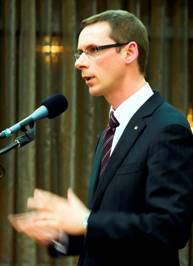
Text: Vidmantas Purlys, Lithuanian ambassador to Ireland
The Easter was dry and sunny in Dublin, and Dubliners were joyful as always during the holidays. The sales of the chocolate eggs were record high, which may have been a pleasant surprise to the chocolate producers in the context of economic difficulties.
Indeed, the economy and finance is a major preoccupation of the Irish government and citizens (or residents, to put it more correctly, given that up to 100 thousand Lithuanians now live and work in Ireland and share the same concerns as Irish, along with Poles, Latvians and other communities).
The economic developments in Ireland – member of the euro zone – resonate far beyond its shores in EU capitals and globally, due to the potential effect which the Irish situation may have on the common currency.
Since 1973 when Ireland became a member of the EU, its economic and social development up to 2008 was largely successful, and was regarded as a model to other countries undergoing transformation, particularly in East Central Europe. The notion of the Celtic Tiger was at the core of brand Ireland, which implied robust economic growth, export led economy, and tax regime and business climate conducive to attracting foreign direct investment (FDI).
Ireland became and still is a rich country: gross domestic product (GDP) per capita in Ireland stood at 48 % above EU average in 2007.
2008 may be regarded as the turning point. The real estate bubble collapsed. The crisis in this over expanded sector adversely affected the functioning of the banking system which was further aggravated by the global financial crisis. In September 2008 the Irish government decided to guarantee Irish banks' deposits and debts to calm investor concern. The majority of Irish banks were effectively nationalized.
This had a negative effect on growth, public finance and employment. In 2009 the value of the GDP fell by 11,3 %, the public balance deficit was 14,3 %, larger than in any other EU member state. Government debt increased to 64 %, up from 25 % in 2007. Unemployment reached 13,6 %.
In November 2010 Ireland entered a loan arrangement with EU/IMF after the interest of borrowing on markets hit a height of 9 %.
The terms of the agreement foresaw an 85 billion loan and set out compulsory conditions in the areas of fiscal consolidation, structural reform, and restructuring of the banking system. It was agreed that the government would cut spending and increase taxes with a view to reach the 3% budget deficit target in 2014. This will require slashing government spending by 15 billion in 2011 alone.
Lithuania supported Ireland at the EU level with regard to the measures directed to assist Ireland to overcome economic difficulties. EU solidarity is important in ensuring economic and financial stability across the EU, which is a key to the sustainable growth of the Lithuanian economy.
Are economic developments of Lithuania and Ireland comparable? Yes, but only to some extent. The economy contracted substantially in Lithuania in 2009 (by 14,8 %), also partly due to the real estate crisis. The banking system remained stable in Lithuania although the credit crunch to businesses was present both in Lithuania and Ireland. Government deficit in Lithuania was much lower - at 29,5% and unemployment was almost identical in both countries (13,7 % in Lithuania, 13,6 % in Ireland) in 2009.
When it comes to government deficit and debt, Lithuania is in a more favourable position. Latest Eurostat figures reveal that in 2010 the largest government deficit among EU27 in percentage of GDP was recorded in Ireland and stood at -32.4% (in Lithuania -7.1%). At the end of 2010, the ratio of government debt to GDP was 38.2% Lithuania and 96.2% Ireland.
Also, importantly, both countries undertook large scale programmes of consolidating public finances, however Ireland have also resorted to the assistance from EU/IMF.
GDP contracted by 1,6 % in Ireland in 2010, and grew by 1,3 per cent in Lithuania. The GDP increased by 4,8 % in Lithuania in the last quarter of 2010. It is expected that the economy in Ireland will turn to growth in 2011.
Although the Irish economy faces important challenges, the economic fundamentals are regarded as strong. The new Irish government, which enjoys support from its citizens, is committed to cutting government’s deficit, increasing competitiveness and creating jobs. Ireland is an open, deregulated economy, with a strong export oriented multi-national sector. Many international companies form the US and elsewhere run their businesses form headquarters in Ireland in sector such as IT, pharmaceuticals, financial services and others.
Working directly with multinationals located in Ireland is an important area of work for the Lithuanian embassy in Dublin in co-operation with various economic agencies in Lithuania in an effort by the Lithuanian government to win FDI.
Apart from the economic affairs, the political relations between Lithuania and Ireland are very close and are set to intensify. The visit to Ireland by the Lithuanian President Dalia Grybauskaitė in May 2010 was an acknowledgement of close ties and an important common agenda ahead of us. Ireland will succeed Lithuania as President-in-Office of the Organization for Security and Co-operation in Europe (OSCE) in 2012.
Also, in 2013 Ireland and Lithuania will hold presidencies of the EU for six consecutive months (Ireland in the first semester of 2013, and Lithuania in second half of 2013). Together with Greece which will succeed Lithuania at the helm of the EU in the beginning of 2014, these three countries will form the so-called EU troika, which has a special responsibility in leading the EU for 18 months.
EU presidency is a complex challenge but also a unique opportunity for Lithuania in further establishing itself as an ambitious and constructive EU member state. EU presidency involves a major preparation in terms of planning. Close co-ordination with Irish partners will be indispensible, and work in that regard is well-underway.
Intensive work in the political domain is an opportunity to further develop cultural and human links between the two countries, increase mutual awareness about Lithuanian and Irish societies.
Of course, the greatest bond which connects Lithuania and Ireland is a vibrant Lithuanian community in Ireland. It is rightly regarded by the Lithuanian government as a most important partner is fostering human and other links between the two countries.
Data in the article from www.cso.ie, www.stat.gov.lt, http://epp.eurostat.ec.europa.eu/portal/page/portal/eurostat/home and www.ukmin.lt.
- Bookmark :
- Digg
- del.icio.us
- Stumbleupon
- Redit it
“We have met the enemy and he is us!”
- Posted by - (0) Comment

Dealing with Russian occupation, as difficult as it was, may have been easier than dealing with ourselves
Dear Editor,
There has been a lot of negative commentary in Vilnews recently from some of your readers and even from Regina Narusiene in the recent piece about the need for change in attitudes toward what the Lithuanian diaspora can do for the country and what volunteerism can do within Lithuania.
I guess I don't disagree at all, however…
Sitting here on the shores of Lake Erie in Cleveland I'm reminded of the battle flag of Commander Oliver Hazard Perry, USN during the decisive battle of Lake Erie during the War of 1812. On the blue flag were the words "Don't Give Up the Ship" which he had to transfer from his sinking flagship to the sistership, Niagara. Commander Perry ultimately won that battle against the Royal Navy and altered the military balance on the Great Lakes. In his report to superiors he stated "We have met the enemy and they are ours".
To all my Lithuanian friends and friends of Lithuania I exhort "Don't Give Up the Ship" . And especially to my Lithuanian friends I quote the "Pogo" cartoon paraphrase of Perry " We have met the enemy and he is us!" Maybe our modern Lithuanian example of heroism needs to be Bishop Valancius who came to the conclusion that in the mid 19th century Lithuanians needed to sober up before they came to any national reawakening or effective resistance to Russian domination.
Dealing with Russian occupation, as difficult as it was, may have been easier than dealing with ourselves. But we have sort of been here before, haven't we? Onward!
Rimantas Aukstuolis,
Vice President Structured Trade Finance Fifth Third Bank, Cleveland, Ohio, USA
- Bookmark :
- Digg
- del.icio.us
- Stumbleupon
- Redit it
Re.: “We have met the enemy and he is us!”
- Posted by - (0) Comment

Yes, it is much easier to blame others for our own shortcomings, so perhaps Lithuania faces the "Tall Poppy Syndrome" and therefore , perhaps, it is a time to leave the past behind and focus on establishing new linkages between the two nations and focusing on rebuilding the future? Nonetheless also re-examining and re-evaluating its own behaviours and have the courage in admitting own mistakes, as it will assist to rebuild the nation!
Barbara
About the ‚Tall Poppy Syndrome‘:
http://en.wikipedia.org/wiki/Tall_poppy_syndrome
- Bookmark :
- Digg
- del.icio.us
- Stumbleupon
- Redit it
Scandinavian police wants the Baltic borders closed again, claiming that Balts account for 80% of the organized crime in the Nordic Region
- Posted by - (1) Comment
![]()
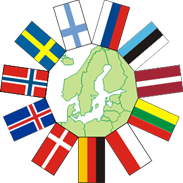
Association of the Nordic Police Corps urges the authorities to reintroduce border controls between countries in the Schengen area.
It is the growing crime rate related to the Baltic states that makes police in the Nordic region want a return to the old days when people had to go through passport control to cross borders, Norwegian newspaper VG reports.
- What happens in the Baltic countries is severe. People from these countries account for 80 percent of the organized crime perpetrated in the Nordic Region. This is a situation that we can no longer live with, "said Arne Johannessen, chairman of the Joint Police Association and vice chairman of the Nordic Council of Police Association.
He sent Wednesday a letter to Norwegian Justice Minister Knut Storberget (Ap) and the other ministers of justice in the Nordic Region with a call to close the borders.
- If the Baltic countries are not doing anything to deal with the growing crime that affects the Nordic countries to a considerable extent, the Schengen agreement and where the limits should go, taken up for serious consideration. Today's open borders is a huge problem for us in the Nordic Region, "said Johannessen. www.aftenposten.no
See also:
http://www.morski.strazgraniczna.pl/eng/bsrbcc.htm
- Bookmark :
- Digg
- del.icio.us
- Stumbleupon
- Redit it
“Yesterday Japan, tomorrow Lithuania”
- Posted by - (0) Comment
![]()
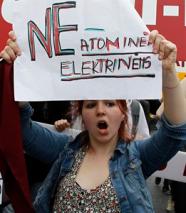
A demonstrator holds a placard during an anti-nuclear protest march in Vilnius 26 April
Demonstrators in Vilnius are protesting plans by neighbouring Russia and Belarus to build new nuclear plants near the Lithuanian border.
Ref also our article of 9 April:
| Russia’s nuclear projects: A deadly threat to energy independence of the Baltic States Text: Dr. Stan Backaitis https://vilnews.com/?p=4604 |
Some 500 protesters marched down Vilnius' main avenue, carrying signs reading "Yesterday Japan, tomorrow Lithuania," on the 25th anniversary of the Chernobyl catastrophe.
Many Lithuanians fear the Russian and Belarusian atomic power stations will be unsafe after environmental impact studies found alleged flaws in the plans.
Lithuania has long been a pro-nuclear-power nation. Before closing its Chernobyl-type reactor in 2009 it was the world's second most nuclear power-dependent nation, after France.
The 1986 Chernobyl catastrophe in the former Soviet Union is still considered to be the world's worst civilian nuclear disaster.
- AP
- Bookmark :
- Digg
- del.icio.us
- Stumbleupon
- Redit it

THE WORLD LITHUANIAN ECONOMIC FORUM
VILNIUS 4 – 5 JULY 2011
There is over a million of people of Lithuanian origin living outside Lithuania. Having left their Motherland in different times and of different reasons they are now living and working in countries around the world. Many of them became successful businessmen: owners or managers of big corporations and companies or highly ranked experts in different fields.
Establishing of a closer relationship with Lithuanians living abroad should nowadays be one of the most important goals in the strategy of our government. The diasporas represent an invaluable source which can enrich Lithuania and help to create a better future of our country.
The goal of the World Lithuanian Economic Forum is to attract Lithuanian business people, economists, politicians and scientists from the entire world into Lithuania’s economic life of today, to strengthen their relations with Lithuania, to encourage them to develop business in our country, to help attract investments, to enterprising growing Lithuanian companies, to create a global network of Lithuanians from all over the world.
The Forum is organized by Lithuanian Business Confederation | ICC Lithuania in cooperation with a number of partners – governmental institutions as well as business companies.
The first Forum, named “Competitive Lithuania: innovative economy, effective business development and investment”, was organized in 2009 in Vilnius. In 2010 WLEF “High tech innovation & investment: local to global” was held in London. Both events got loads of attention from public and media. Following the traditions this year WLEF comes back to Vilnius and will be held 4 – 5 July.
The main theme of his year’s event is the creation of a competitive state. Experts, business people and scientists of different spheres from all over the world will discuss the vision of the world and Lithuania in ten years, the creation of competitiveness through innovations, a partnership between business and science, the encouragement of starting and growing businesses.
For registration and additional information, go to http://www.plef.lt/
- Bookmark :
- Digg
- del.icio.us
- Stumbleupon
- Redit it
Easier to obtain an audience with the Pope, than with a minister for foreign affairs of Lithuania
- Posted by - (0) Comment
![]()
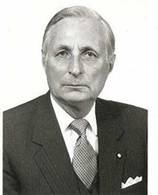
Ambassador Algirdas Žemaitis
You have lived long enough in Lithuania and must realize that many of the problems of the present day Lithuania are due to their reluctance to learn from the Western countries or accept advice from Lithuanians who lived and studied in the West. The relative success of Lithuania after World War I was largely due to the replacement of Russian educated officials by those who got their degrees in the West. My own father was the first Lithuanian with a degree in forestry from a Western university and introduced major reforms in the forest management, which survived even during the Communist occupation.
Alas, after 20 years of restoration of independence to paraphrase Kipling "The East is East, the West is West and the twain shall never (so far) meet". I spoke to a number of Lithuanians with degrees from top Western universities, who don't want to return to Lithuania - according to them, the "natives" know everything better.
I might add that for me it was easier to obtain an audience with the Pope, than with a Minister for Foreign Affairs of Lithuania.
Ambassador Algirdas Žemaitis,
Vilnius – Rome
- Bookmark :
- Digg
- del.icio.us
- Stumbleupon
- Redit it

Victor Vytautas Pakalnis
Reminds me of the 90's in Ontario , Canada when the head of the Ontario Public Service , Rita Burak got so frustrated at the quality of customer service within the public service that firm email / phone standards were put in place : phone calls had to be answered within 3 rings and if it went to voice mail , the person receiving it had to indicate today's date and when a call would be returned , usually 1 working day unless they were on vacation . There was always a " 0" option to get to a live operator . And in spite of grumbling at the senior ranks - new habits were formed and new expectations realized within one year - particularly since the service standards became part of every public service executives’ pay for performance plan. It was tracked - audited and rewarded or corrected . Every public service in the world strives to improve its service to its citizens - The Institute for Citizen Centered Service ( Google: ICCS Canada ) found the leading determinant of quality public service is TIMELINESS - the others : professionalism , courtesy , fairness , going the extra mile , outcome...
Victor Vytautas Pakalnis, P..Eng. Canada
- Bookmark :
- Digg
- del.icio.us
- Stumbleupon
- Redit it
Sending e-mail to Lithuania is like sending it to the black hole of the universe
- Posted by - (0) Comment
![]()

Vytautas Sliupas
Lithuania's business people and government officials are yet to learn the necessity of good communications. Without a two way communication there is no possibility for further contacts. One of the most frustrating experiences I had was in e-mail (before that it was in regular "snail mail") communications. I would write and write but receive no reply (with only a few exceptions). When I was working, our management had a rule - "answer all letters received in not more than three daysIf there is no answer to be given, then at least acknowledge the receipt".
One of my American colleagues, who was sincerely trying to help Lithuania, said "Sending e-mail to Lithuania is like sending it to the black hole of the universe. Everything goes one way and nothing comes back". No wander he is now disenchanted and helping others
Vytautas Sliupas, P.E.
www.aukfoundation.org
Burlingame, California
- Bookmark :
- Digg
- del.icio.us
- Stumbleupon
- Redit it

Lithuanian American Council (LAC) Delegation in Conference at Lithuania’s Embassy (LE) in Washington, D.C. 1 April:
From left to right: Ambassador Žygimantas Pavilionis, Debra Miller (LAC), Rolandas Kačinskas (LE), Paulius Vertelka (LAC), Nida Gelažytė (LAC), Henri Gaidis (LAC), Emanuelis Zingeris (Lithuanias Parliament), Bernice Aviža (LAC), Saulius Kuprys (LAC), (LAC), Bronius Čikotas (LAC), and Simonas Šatūnas (LE)
Photo Inga Lukavičiūtė (LE)
Text: Stasys Bačkaitis
A delegation representing the Lithuanian American Council (LAC) was received at the Lithuanian Embassy in Washington D.C. on April 1, 2011, where it met with the Chairman of the Foreign Affairs Committee of the Lithuania's Parliament, Emanuelis Zingeris and Lithuania's Ambassador to the United States, Zygimantas Pavilionis. Also in attendance were members of the embassy staff including Deputy Amb. Simonas Satunas and Deputy Minister Rolandas Kacinskas. The LAC delegation was led by LAC president Saulius Kuprys and included Bernice Aviza, dr. Stasys Backaitis, Bronius Cikotas, Henry Gaidis, dr. Nida Gelazyte, Debra Miller, and Paulius Vertelka.
In the course of the meeting LAC representatives expressed their concern on a wide range of topics including Lithuania's developing energy policy, the country’s image in the international community, emigration issues and their demographic impact, the prospect of maintaining citizenship rights of recent immigrants, ongoing cooperation between organizations of the Diaspora and Lithuania, and minority issues in Lithuania. LAC representatives suggested that Lithuania would benefit significantly by availing itself of the expertise and knowledge found in the Diaspora communities in developing energy and security policies and a host of other areas such as environmental issues, ecology, medicine, economic development, and the promotion of improved interactions between the government and the people through non-governmental organizations. It was suggested that an interactive website between Lithuania and Lithuanian communities throughout the World would not only be a step in the right direction, but would also assist in improving the country's image in the international community and would provide a vital channel for dialogue seeking solutions to issues of common concern.
Mr. Zingeris thanked the Lithuanian American Council and its member organizations for their ongoing contribution in fostering bilateral U.S.-Lithuanian relations and in constructive cooperation especially in promoting Lithuania's admission to the Atlantic alliance. Mr. Zingeris noted that Lithuania needs continuing support from the West as new issues develop. Minority issues are being addressed, and it is anticipated that they will be resolved in the near future. A primary concern in the realm of energy security is the proposed construction of two nuclear power plants at Lithuania's eastern and southwestern borders at the behest of the Russian interests. This is not a question of merely local interest but one which has far-reaching international ramifications as it affects the safety and stability of the entire region and the future of emerging democracies. Members of the delegation noted that American Lithuanian organizations are in the process of raising these concerns to the attention of their elected representatives since the issues also touch upon vital U.S. interests and potentially impacts the entire Western alliance.
Mr. Zingeris observed that the proposed interactive website which would enable dialogue between Lithuania and the communities in the Diaspora was an intriguing proposal. Its potential benefit warrants further discussion and study. He will pursue the subject matter upon return to Lithuania. Ambassador Pavilionis conveyed on behalf of the government of Lithuania its gratitude to Lithuanian Americans and their organizations for their invaluable contribution in reestablishing Lithuania's independence and acknowledged their continued active support since then. Lithuanian American organizations play a significant role on the international stage as proponents of democracy and the rule of law. The active participation of Lithuanian Americans is key in facilitating continued dialogue between the US and Lithuanian administrations, especially in the area of security and energy policy. Ambassador Pavilionis noted in closing that such face-to-face meetings are mutually beneficial and ought to be convened on a regular basis.
The LIthuanian American Council established in 1915 today encompasses 18 national organizations.
- Bookmark :
- Digg
- del.icio.us
- Stumbleupon
- Redit it
Information from Lithuania could have prevented the Chernobyl disaster of 26 April 1986
- Posted by - (0) Comment
![]()
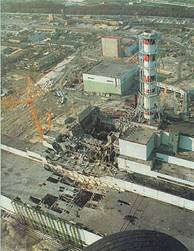
The Chernobyl nuclear reactor after the disaster. Reactor 4 (center). Turbine building (lower left).
Reactor 3 (center right).
http://en.wikipedia.org/wiki/Chernobyl_disaster
Kiev - The Soviet-era reactor used at the Chernobyl nuclear power plant contained several design flaws that contributed directly to the 1986 accident, studies have shown.
Unlike modern reactors, the one employed at Chernobyl, known as a high-power channel-type reactor (RBMK), was not designed to contain unexpected radiation leaks.
Engineers at Lithuania's Ignalina plant, who also operated RMBK reactors, had uncovered this shortcoming before the Chernobyl accident.
The Soviet government made the Ignalina findings secret, and Chernobyl engineers were not aware of it when they conducted a low- power reactor test in the early morning hours of 26 April 1986.
Most RMBK reactors were taken out of commission after Chernobyl. Russia continues to operate six, which have received upgrades in control systems, housing and safety equipment.
Sources: International Atomic Energy Agency, Ukraine's Emergency Situations and Chernobyl Ministry.
Source:
http://www.monstersandcritics.com

Radioactive fallout after Chernobyl.
- Bookmark :
- Digg
- del.icio.us
- Stumbleupon
- Redit it
VilNews e-magazine is published in Vilnius, Lithuania. Editor-in-Chief: Mr. Aage Myhre. Inquires to the editors: editor@VilNews.com.
Code of Ethics: See Section 2 – about VilNews. VilNews is not responsible for content on external links/web pages.
HOW TO ADVERTISE IN VILNEWS.
All content is copyrighted © 2011. UAB ‘VilNews’.

 Click on the buttons to open and read each of VilNews' 18 sub-sections
Click on the buttons to open and read each of VilNews' 18 sub-sections 















.jpg)



